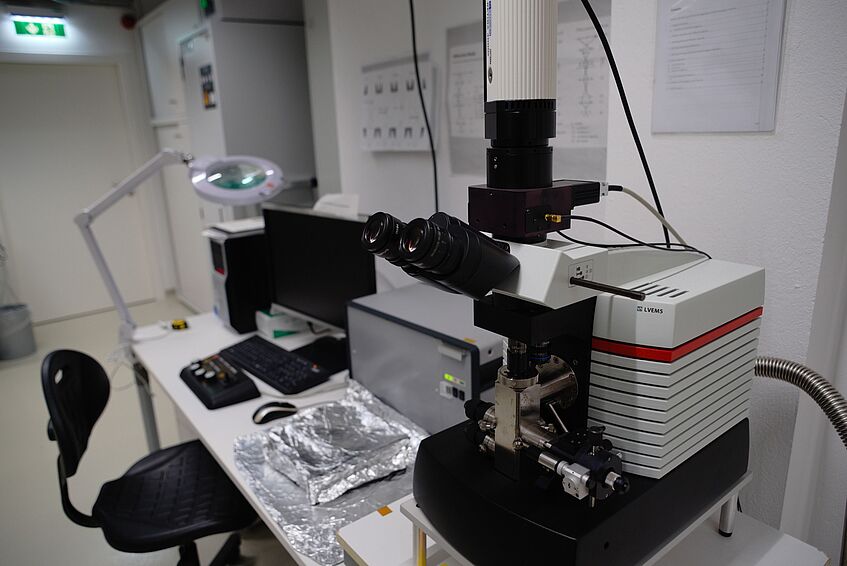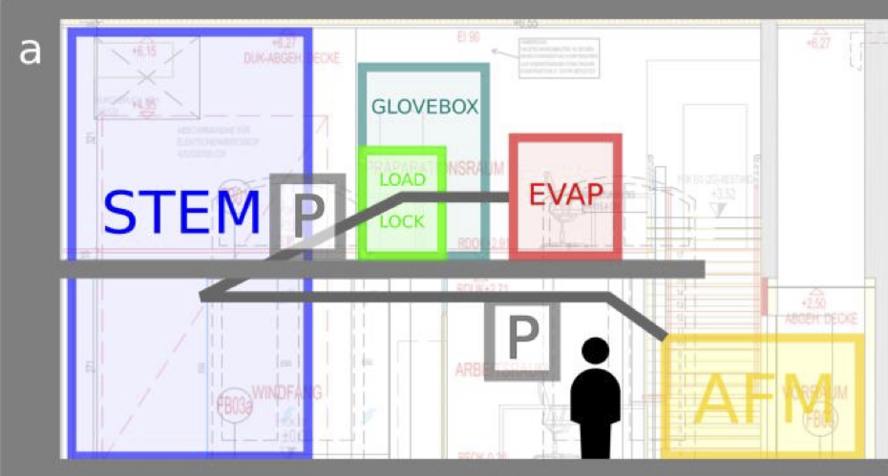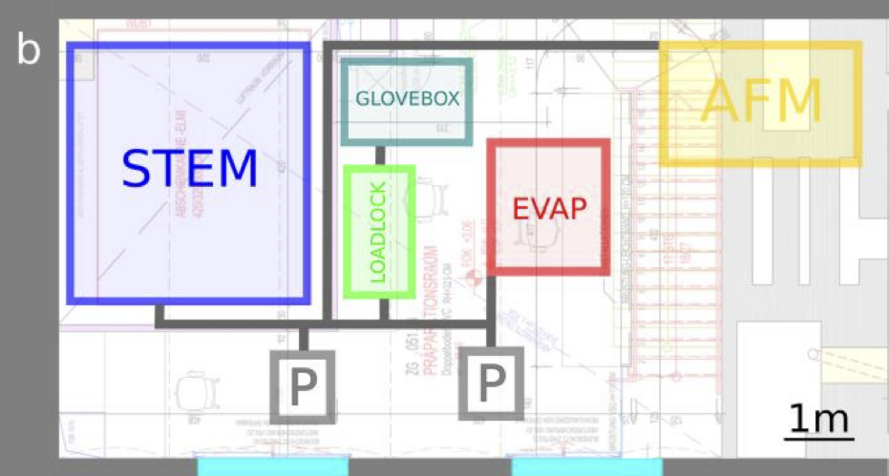Equipment
Physics of Nanostructured Materials (PNM) carries out research benefiting from state-of-the-art complementary experimental methods, such as atomic resolution scanning and transmission electron microscopy, transmission electron microscopy, associated spectroscopic techniques, and scattering with synchrotron radiation. The main instruments operated by the research unit are an aberration-corrected ultra-high vacuum scanning transmission electron microscope (Nion UltraSTEM 100) with versatile extensions for in-situ experiments and a Cs image-corrected transmission electron microscope (FEI Titan 80-300). Additionally, PNM also develops physical models to clarify the experimental results, and develops state-of-the-art computational techniques based on ab initio simulations. Most of the equipment is located in the 18th district of Vienna in the Universitätsternwarte, and old observatory building (how to get there).

CANVAS
CANVAS (a system for Controlled Alteration of Nanomaterials in Vacuum down to the Atomic Scale) is built around an aberration-corrected ultra-high vacuum scanning transmission electron microscope, connecting several experimental stations in the same near-ultrahigh-vacuum. It allows preparation and growth of materials in a protective atmosphere (Ar glove box) and in vacuum (thermal and ebeam evaporators), their controlled manipulation (Specs plasma source), atomic force microscopy and mechanical testing (GeTEC AFSEM by Quantum Design), and atomic-resolution microscopy and spectroscopy (Nion UltraSTEM 100). The system is described in this publication.
Contact: Clemens Mangler, Kimmo Mustonen or Jani Kotakoski (PNM)
Location: Universitätssternwarte, PNM Laboratory
Phone: +43-1-4277-72888
Floorplan
Sternwarte Preparation Laboratory
Sternwarte preparation laboratory is a basic chemical laboratory with equipment necessary for creating and precharacterizing 2D materials samples. The instrumentation includes a fume hood, chemical vapor deposition setup, Olympus BX51WI light microscope with a micromanipulator, small workbench for electronics, probe station, wire bonder, plasma cleaner and the low-voltage desktop electron microscope LVEM5.
Contact: Clemens Mangler, Kimmo Mustonen or Jani Kotakoski (PNM)
Location: Universitätssternwarte, PNM Laboratory
Phone: +43-1-4277-72887
Microscopes
Nion UltraSTEM 100
The aberration-corrected ultra-high vacuum scanning transmission electron microscope Nion UltraSTEM 100 is at the heart of the group's experimental activities. The instrument has a constant-current operation mode for voltages between 55 and 100 kV with a probe size of ca. 1 Ångström, allowing atomic-resolution microscopy and spectroscopy. Its objective area has been modified for experiments in controlled atmospheres between 10-10 and 10-6 mbar, laser heating through a viewport, and an high-vacuum transfer line directly connecting it to the CANVAS system.
Contact: Clemens Mangler or Jani Kotakoski (PNM)
Location: Universitätssternwarte, PNM Laboratory
Phone: +43-1-4277-72888
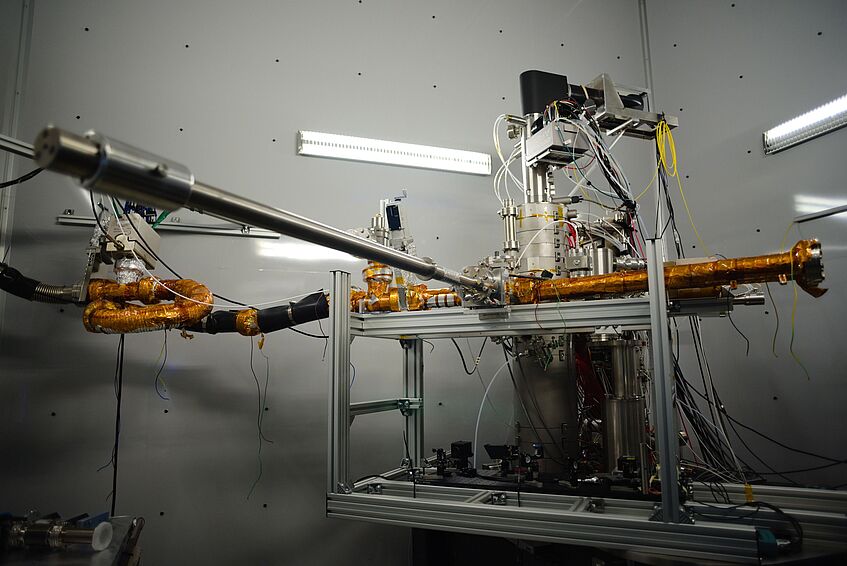
Dectris ARINA detector
The Dectris ARINA is the latest-generation direct-electron camera that is optimized for ultrafast measurements at the lower primary beam energies. The Si-based sensor chip has 192×192 unusually large pixels of 100×100 μm in size, allowing it to accurately count every electron for any realistic electron-beam current. The speed of the camera is limited by the readout electronics' bandwidth of 10 Gb/s, resulting in a full-frame readout at 20 kHz or 2× binned and compressed readout at 120 kHz – corresponding to typical ADF scan rates. The ARINA thus enables uncompromising 4D-STEM measurements, bringing the group's experimental capabilities to the very leading edge of research worldwide.
For more information, see the Dectris website.
Contact: Toma Susi (PNM)
Location: Boltzmanngasse 5, 3215
Phone: +43-1-4277-72855
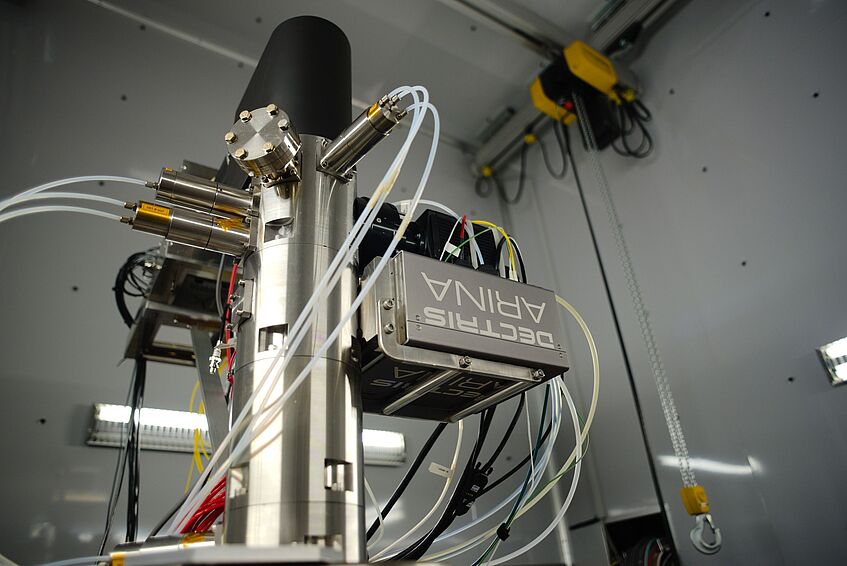
FEI Titan 80-300
Transmission electron microscope from Thermo Fisher with an aberration corrector (CEOS Cs image corrector) an SFEG electron source, Gatan Tridiem 863 image filter for EELS, Oxford Instruments EDX system, and capabilities for tomography, scanning transmission electron microscopy, as well as liquid-phase and in-situ microscopy (mechanical, thermal and electric). Available acceleration voltages range from 80 to 300 kV (currently aligned at 80 kV, 200 kV, and 300 kV).
Contact: Christian Rentenberger (PNM)
Location: Universitätssternwarte, PNM Laboratory
Phone: +43-1-4277-72889
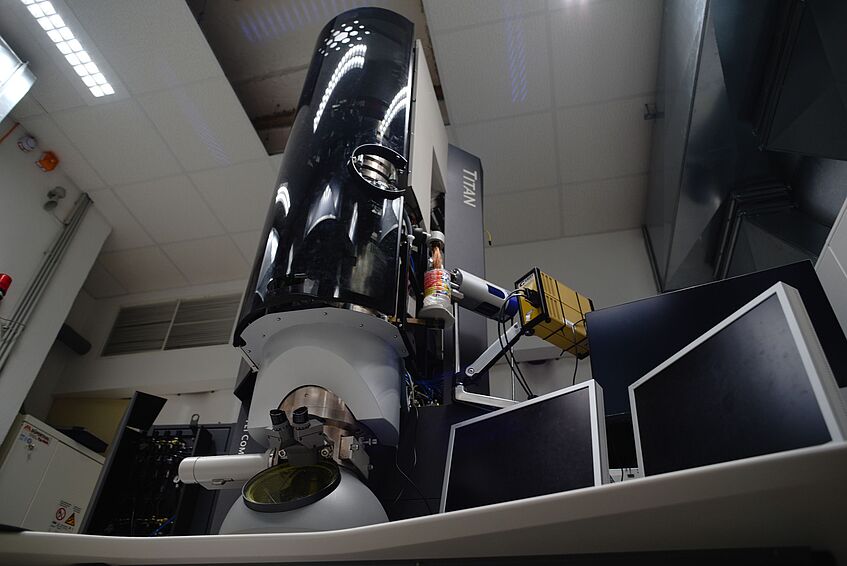
LVEM5 Mini-TEM
Delong Instruments Low-Voltage Electron Microscope (LVEM5) with an acceleration voltage of 5 kV. The microscope can be operated in transmission electron microscopy (TEM) and electron diffraction (ED) modes, as well as as an scanning electron microscope (SEM) and a scanning transmission electron microscope (STEM).
Contact: Clemens Mangler (PNM)
Location: Boltzmanngasse 5, 3216-17
Phone: +43-1-4277-72888
